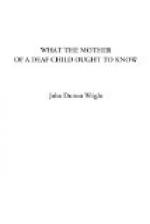If no oral day or boarding school is available near at hand, the mother should have the far-sighted love that is unselfish, and the courage to part with her little five-year-old child during the months of the school year, and place him in some one of the distant schools where he can live and be taught in a purely oral environment. There are two alternatives to this, each of which is sometimes attempted, but both are undesirable. First the mother not infrequently attempts to have her child educated in the schools for hearing children. This is very unsatisfactory and even dangerous, for if persisted in it results in wholly inadequate progress, uneven development, bad speech, irretrievable loss of time, and often in a complete nervous breakdown. This may not come for some years, but the nervous system, once undermined by the excessive strain of trying to keep up under impossible conditions, can never be fully repaired. Here is what a partially deaf woman writes of her experience as a child:
“When I was three and one-half years old scarlet fever left me almost totally deaf. My father was a physician. He was urged to send me to a school for the deaf, but his medical training told him that what was needed was association with speaking children, if I were to retain my speech, for at that time the oral method was unknown in our state. So I went to school with hearing children. Unless you have been deaf, you will not understand the misery in this statement. A little, lonely deaf child, I went to a public school, hearing practically nothing of the teachers’ instructions or the pupils’ recitations. Of the torture of that deaf childhood I will not speak. You all know how cruel children may be, and a deaf child among hearing children often suffers untold torments.”
The second alternative is to seek some person who will teach the child in his own home. This, too, is very unsatisfactory, and involves loss of time and opportunity that can never be recovered.
In the first place, the beginning years of a deaf child’s educational life are the most important of all. They are crucial. It is then he requires the highest skill, the greatest experience, and the most perfect conditions. The best teachers can seldom, if ever, be induced to teach a single child in its home. Usually these teachers are more or less inferior. But even the best teacher in the world cannot do for a little deaf child in his home what she could accomplish for him in a well-organized and properly conducted school.
Neither the intellect nor the character of the deaf child can be as successfully developed, after five years of age, by a private teacher in his home as in a good school.
The following elements are essential for the highest educational welfare of a deaf child:
First. The stimulus and incentive of association and competitive companionship.
Second. The contact with more than one mind and more than one speaker.




